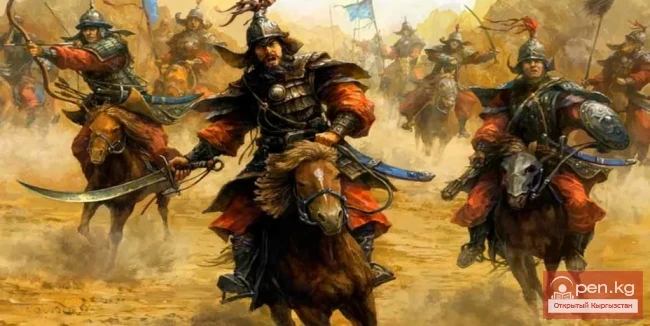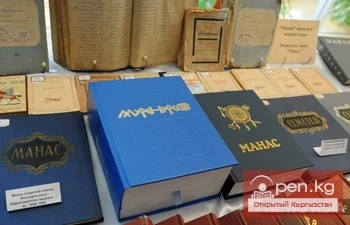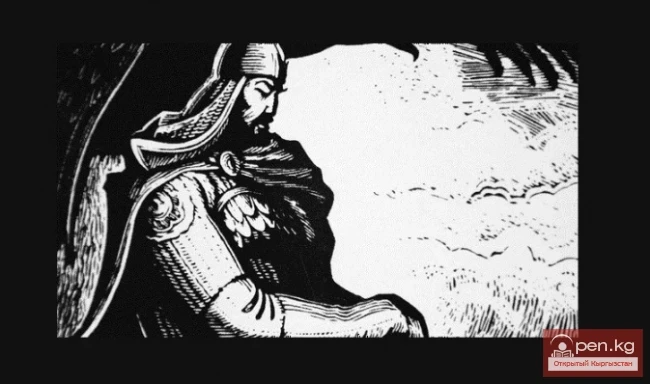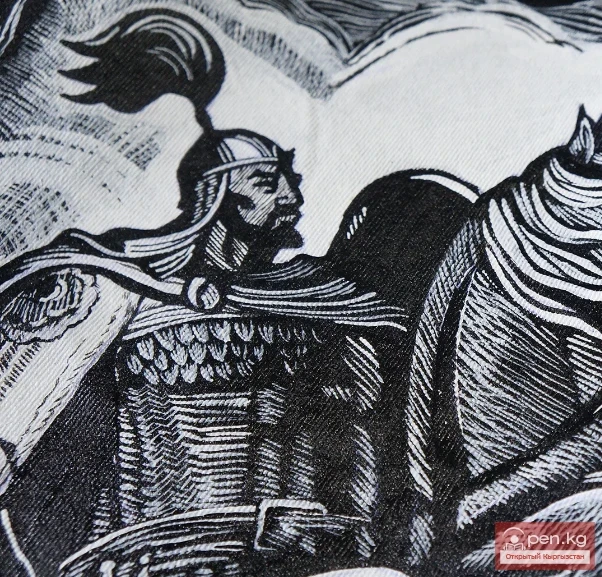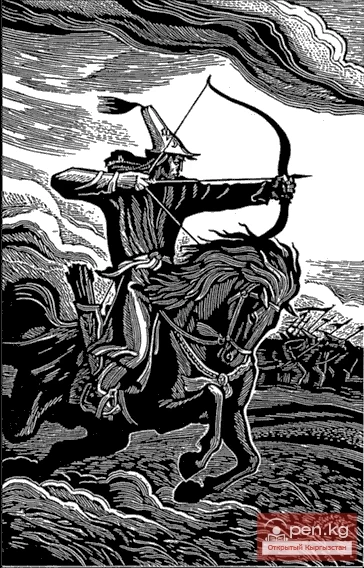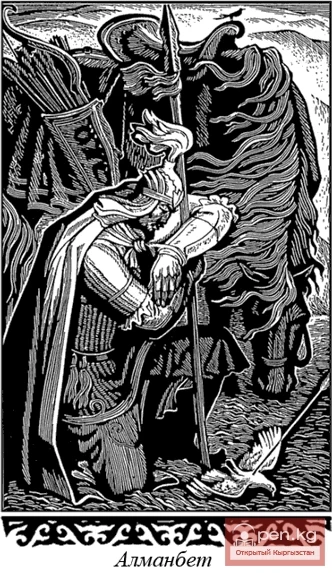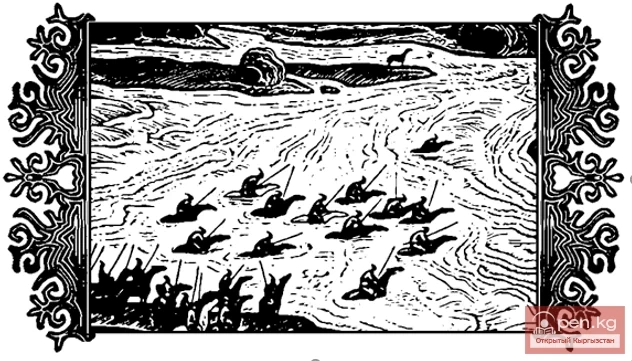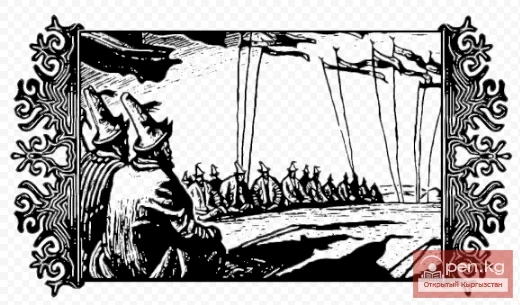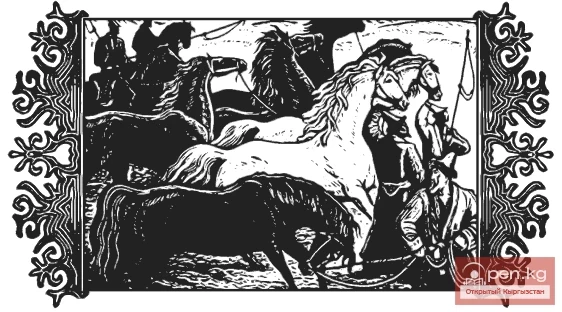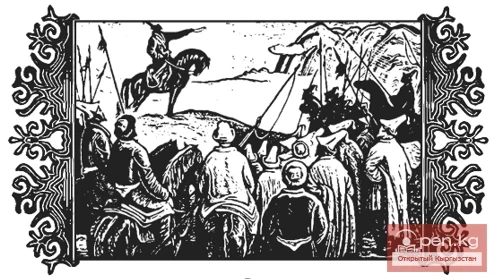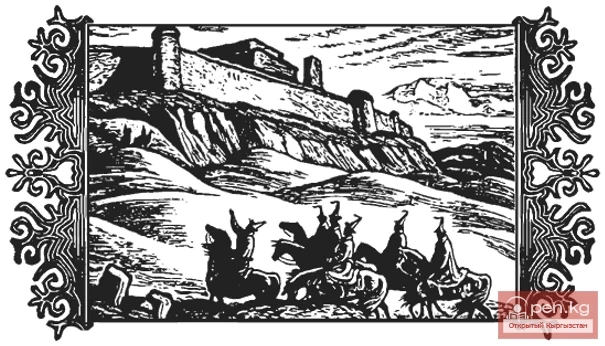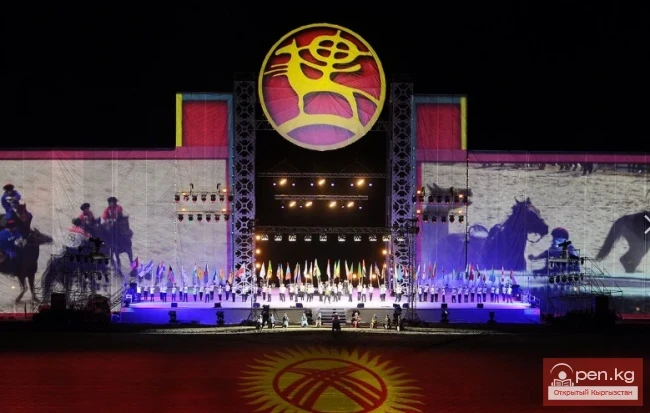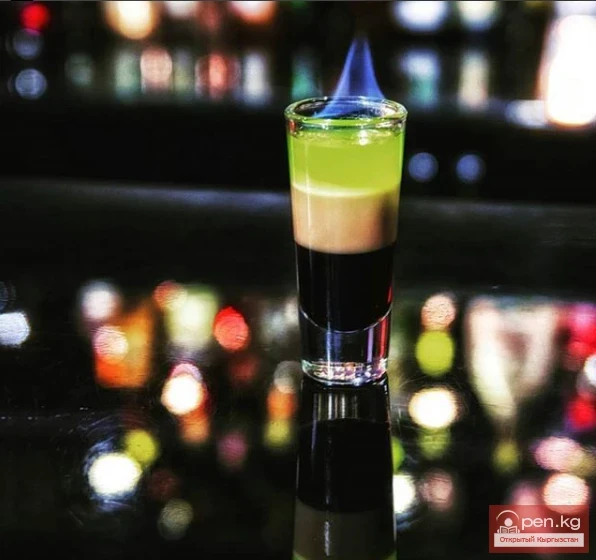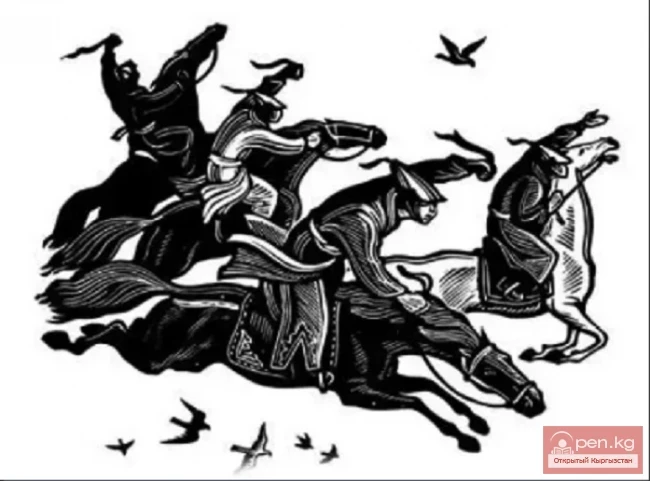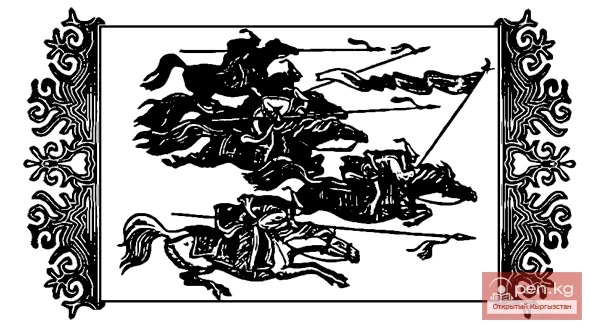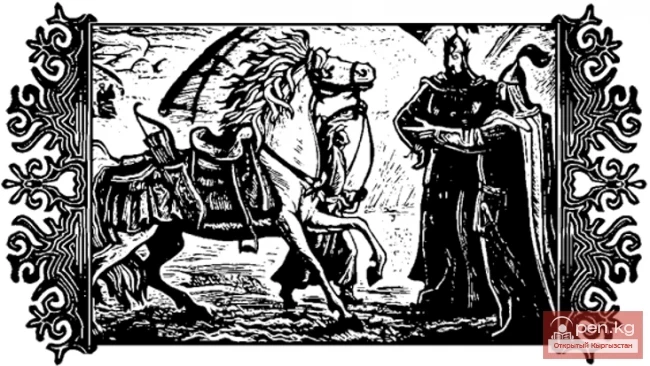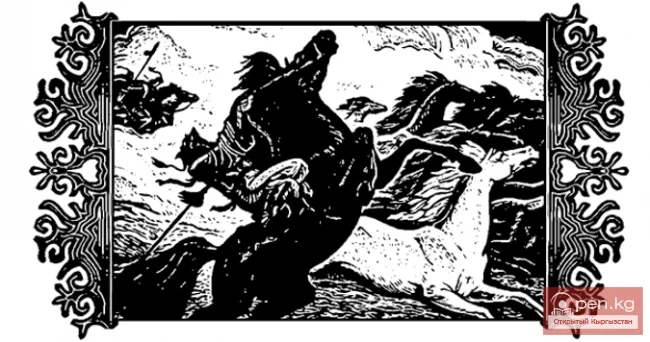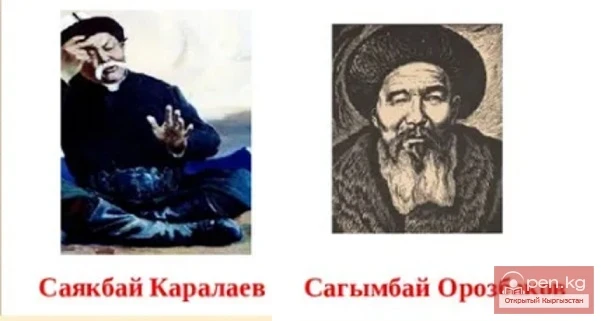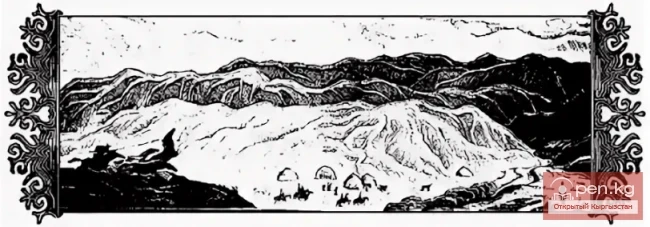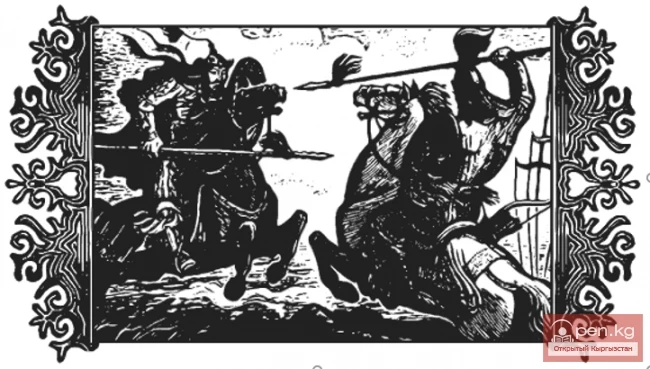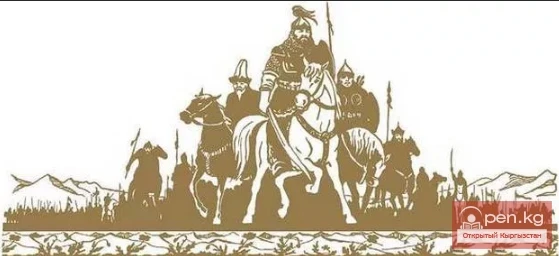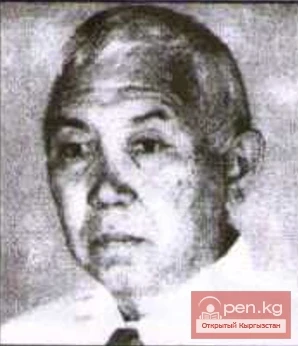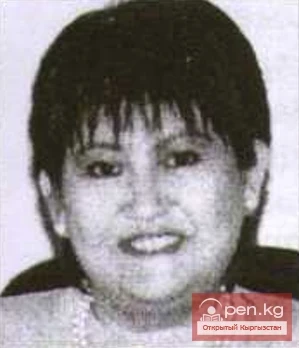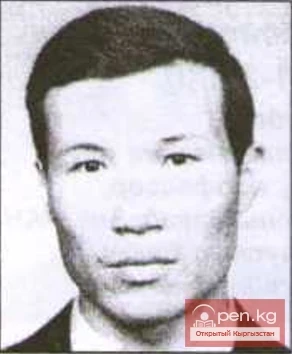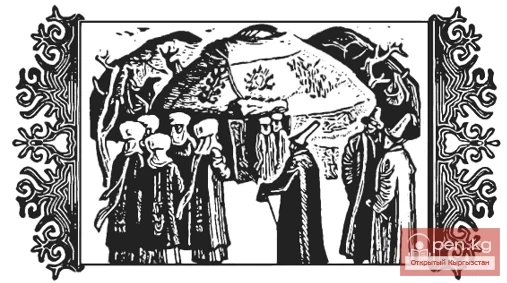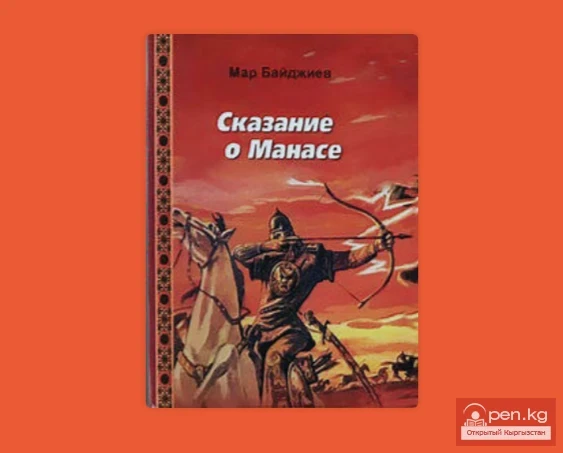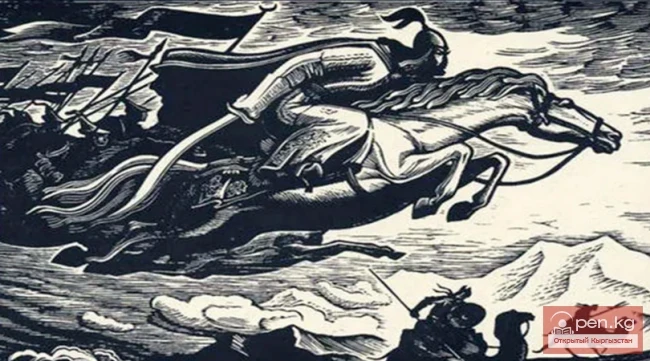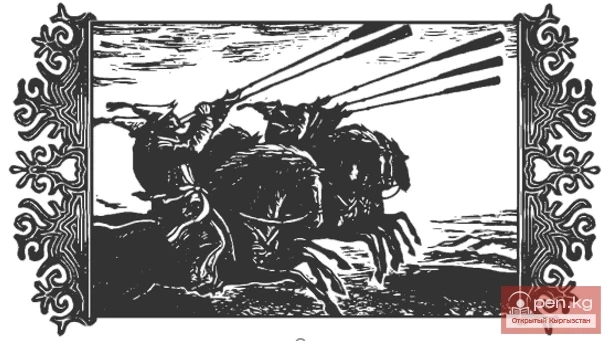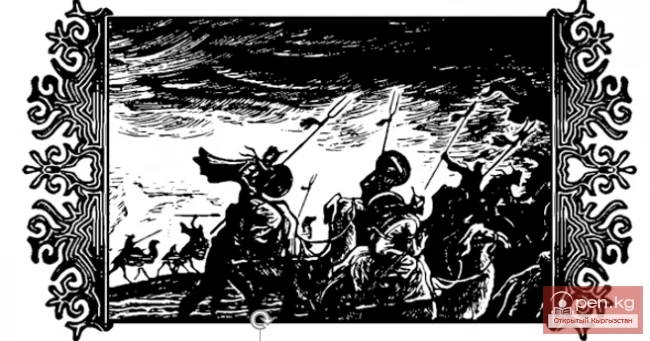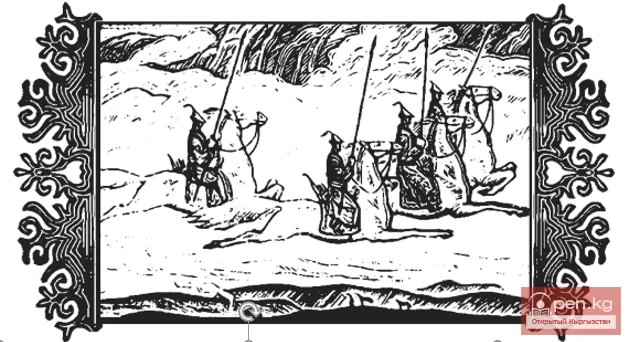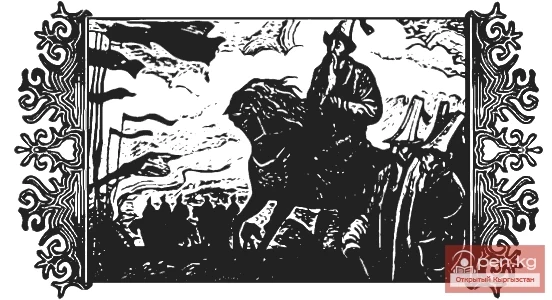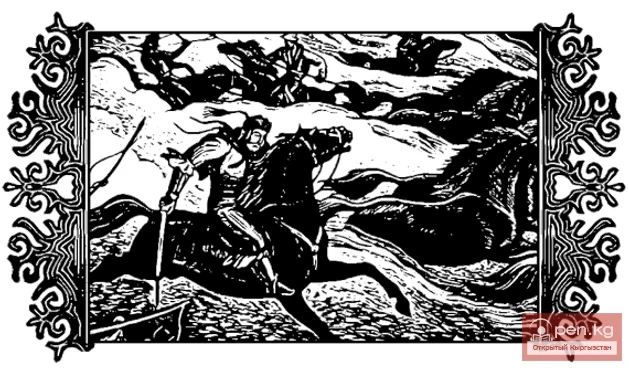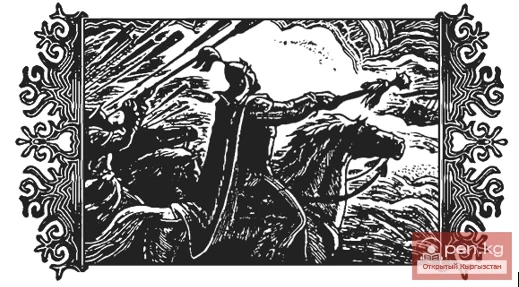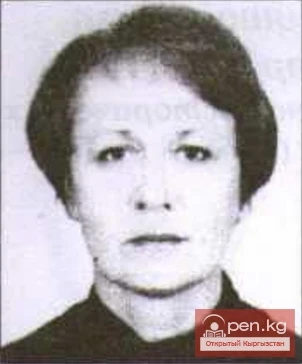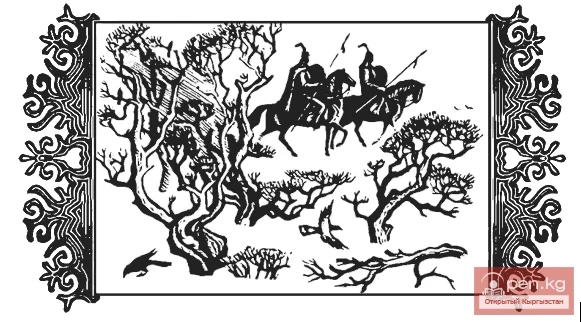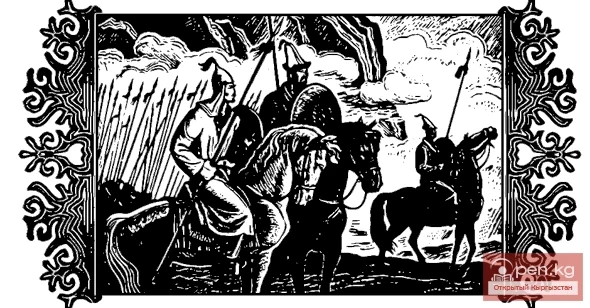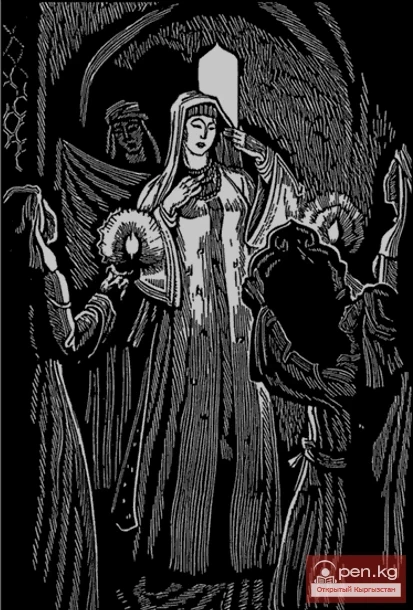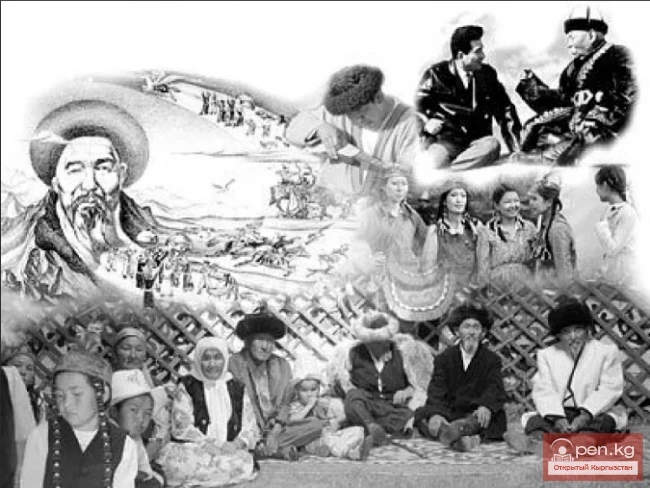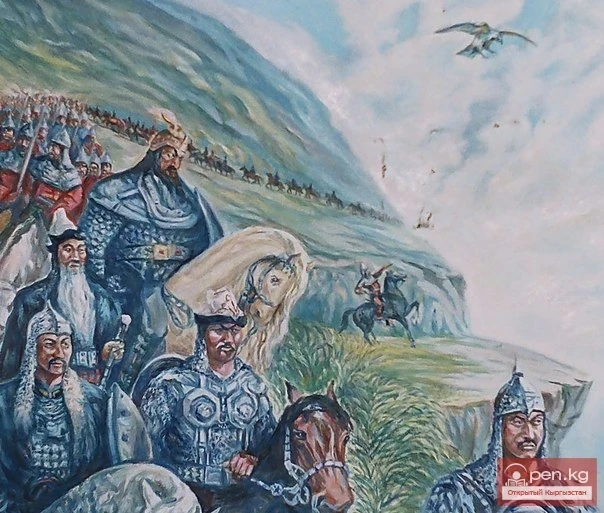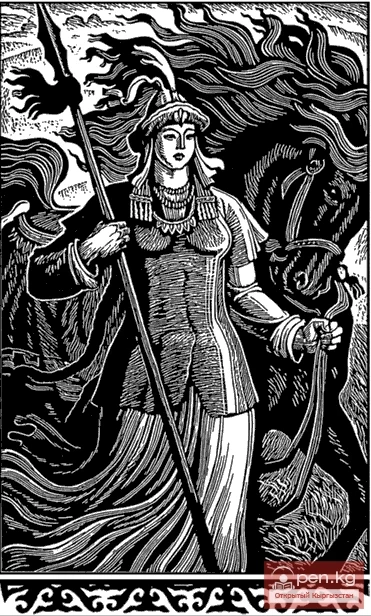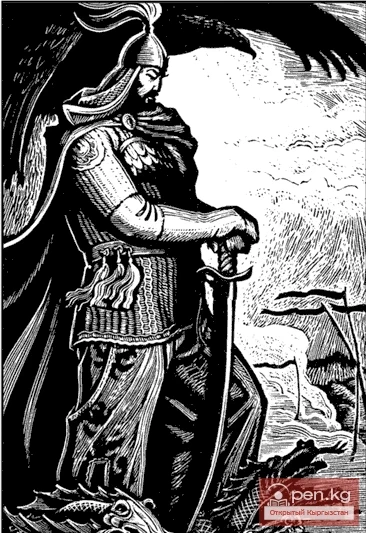ABOUT HOW ESEN-KHAN SENDS AN ARMY AGAINST MANAS UNDER THE COMMAND OF DJOLOY
So, ten thousand warriors led by DjoLOY and Dongo, who set out on a campaign to capture Manas, were defeated and scattered, fleeing all the way to Beijing.
Beaten, bloodied, and swollen like a bag of skins, DooDur cried and howled as he walked day and night until he reached the camp of Esen-Khan and, barely mumbling, told what had happened:
– Oh, your highness, my Khan! I will tell you everything that happened; please listen to me carefully.
Almost all of the ten thousand troops who set out to capture Manas did not return. All who fought this wicked brute were killed. The strongmen Dongo and Kaman, the hero with split ears Djoon, and the giant Kocku met their deaths there and did not return home. Who knew what Manas was like? When he was called "The Great Bully," everyone thought he was just one of many bullying brutes, and they fell for the deception. He crushed all the strongmen, defeated all the warriors, and destroyed everyone who confronted him. The hero DjoLOY, on whom you had placed your hopes, was all bloodied, wounded, and powerless to fight further; he barely escaped only after he managed to break free, and I heard he fled, leaving all his shattered army behind. Oh, great Khan, for you, this may be untrue, but for me, it is the truth. The scoundrel Manas is not just any brute; he is a brave man deserving of all honors, a hero capable of devastating Beijing, defeating everyone who dares to confront him. He spares no one, leaves no one alive; he is unlike any of the heroes that have existed until now.
Hearing the words of DooDur, Esen-Khan became furious. He alternately jumped up from his golden throne and sat down again, and as he glared at all his subjects surrounding him, the bravest and most valiant warriors died of fear before his wrath. The king ordered the drums to be beaten and summoned all his great lords of this world, his close friends Ai-Djan-Dzhun and Kun-Djan-Dzhun, the two magicians Luypu and Suypu, all the experts and rulers of men, all his clairvoyant sorcerers.
– Hey, sorcerers! I thought you were clairvoyants, but you are like the dead, seeing nothing. You, cursed Manchus, overlooked Manas, who was born right under your noses! Sixty of you sorcerers, I would destroy every last one of you.
Throwing on a robe, raging like a tiger in a cage, the furious Esen-Khan nearly destroyed all his cowardly officials, Turgots, Kara-Kalmak, and Manchus. He sent his messengers in all directions to summon all the skilled fighters on horseback, all the brave ones unafraid of death, all the broad-chested strongmen, all the bold fighters unafraid of hand-to-hand combat, all the courageous warriors unafraid of gunfire, all the battle-hardened knights unflinching in a swift attack, all the riders, fast runners, and accurate shooters ready to stand under his banners.
At the first command of the ruler, all the Turgots quickly gathered, followed by the Manchus and Chinese. The best warriors rushed in, led by the Manchu Khan Neskara, the Kalmak Khan DjoLOY, and the chief magician Karadzhoy. Colorful banners fluttered all around, spears stood everywhere, horsemen separated from foot soldiers, lined up like threads in a row, waiting at the Khan's camp. After a while, the ruler Esen-Khan came out with his attendants, walked ceremoniously, and stood before the thousands of troops. The ruler called the skilled archer Karadzhoy to him.
– Hero Karadzhoy, I only hope for you. Deal a blow to this bloodsucker of a brute. You are the most accurate archer, and you lack for heroism, lead the warriors and go to Manas. Kill his steed, and bring him to me alive. If you bring Manas, I will fulfill any wish of yours, make you the ruler of Bakburchun; I will find a way to reward you. Go, hurry, dear.
Then Esen-Khan called the giant DjoLOY. When he awkwardly approached him with a guilty look and his head down, Esen-Khan immediately unleashed a torrent of insults:
– Ah, you worthless hero, DjoLOY. I thought you could crush the whole world, but you turned out to be a coward. I thought you could eat eighty-four poods of wheat and kill eighty warriors, but you turned out to be just a glutton. Where will I now find strongmen like the heroes Dongo and Kaman? You sent my best warriors to be torn apart by brutes; what have you done? You would have been better off dying yourself than gorging yourself like a fat camel! Your entire army was destroyed; you would have been better off dying with them! Here’s what I will say to you, remember it well. You will confront this bloodthirsty brute, and either you will perish if it is destined, or you will find a way to gouge out his eyes, defeat him, and slaughter him like a filthy sheep. If you cannot defeat him, then you had better die with dignity.
Fight him for six months straight if you must, but draw blood from this wicked brute. You would be better off dead than walking around beaten, swollen from blows, and bloodied!
Esen-Khan was furious that he had lost so many warriors, deprived of so many heroes and strongmen, and this only made him more furious with the giant DjoLOY, and thus he sent him on the campaign.
He also sent Kun-Djan-Dzhun at the head of a thousand strongmen to capture Manas. Another thousand warriors were sent with Ai-Djan-Dzhun on a fast horse with a tied tail. He was dressed in chain mail with chains at the back and in battle armor with an impenetrable chest, which Esen-Khan had gifted him. They too intended to capture and bind Manas and deliver him to their great ruler Esen-Khan.
Leaving behind all the weak, gathering all the skilled spearmen, assembling all the masters of battle on halberds, dressing them in government armor, calling upon warriors from the monks in cotton robes and wide boots, he set out to destroy all forty houses of the Kyrgyz, and the giant with extraordinary strength DooDur. And they all rode on mules, which traveled tirelessly for forty days, easily overcoming any passes, completely without water and grass, calmly enduring all the hardships of war. To catch and bind Manas, the famous archer Karadzhoy followed, adorned with nine-colored parrot feathers, dressed in red impenetrable robes. Along with him rode the masters of lasso throwing with metal ropes in their hands.
Even DjoLOY rode with a thousand troops, killing anyone he confronted, this giant who could eat a whole calf in one sitting. He was dressed in blue armor, smoke billowed from his mouth, and his eyes burned with fire. Esen-Khan's words had struck him hard, and out of rage, he was ready to gouge out the eyes of Manas himself, and along with him, Akbalta and Bai Djakyp, he longed to drink their blood, and from this, his cheeks puffed up, and his anger bulged from his face. To capture Manas, the hero Neskara rode, endowed with a special strength and heroism unlike any other man.
He also gathered a thousand troops of skilled archers, the best lasso throwers, and fierce infidels who do not falter even in a flood, who are not afraid even of a fiery blaze, fearlessly charging forward against the enemy.
Seven thousand strongmen rode at the command of their ruler to crush the brute lord Manas to the ground, to arrange a bloody slaughter and plunder all the livestock. Even warriors who did not flinch under the sword's blow, heroes who did not cry out under the blow of the halberd, archers who hit the enemy accurately, strongmen who wielded spears skillfully, led by Khan DjoLOY, with Neskara behind – all moved in a tight row. And the ranks of warriors were closed by the strongman DooDur and the archer Karadzhoy, and the army resembled swarms of insects filling the entire land.
The day before, when the son of Djakyp, the young Manas, had caused a rout and slaughtered the heroes Dongo and Kocku, when he had killed the strongmen Djon and Kaman, Akbalta and Bai Djakyp pondered and decided to prepare for the departure to the homeland of the Kyrgyz.
Having castrated the stallions and made them geldings, castrated the camels and made them barren, driving away the horses and leaving the Altai Kalmak foot soldiers, the small tribe of Kyrgyz set out on their journey, driving ahead all the pack animals, spreading their livestock for many miles around. Together with screaming children, they moved day and night without rest towards Altai.
At that time, Kutubiy, riding on Telkyzyla, went on patrol to the foothills of the enormous mountain, to the cape at the foothills. What he saw nearly clouded his mind. He could not believe his eyes: Chinese heroes in battle gear occupied all the surroundings, the army even included officials. Like a thicket of reeds, like the spring flood, a numerous armada moved, echoing the Chinese battle cry throughout the area. Under the banner with a white flag, with wide sleeves, with a pit dug for themselves, with inevitable disaster, the giant DjoLOY rode. To the loud rumble of drums, with an innumerable number of strongmen, like ants in black armor, the Manchus moved at the Altai mountain outcrop, led by Neskara.
Could it be that in the old age of Akbalta, in the weakness of Bai Djakyp, in the absence of the hero Manas, an innumerable army would wreak havoc on the small Kyrgyz? Could they capture the peaceful Kyrgyz and take all their livestock? Just a moment ago, there was a people, and now there is none – here is the answer to a life full of filth. I will go and inform the Kyrgyz from the forty houses, let forty brave heroes come out from all forty families, I will stand at the forefront and block the enemies' path. So thought Kutubiy, full of dignity, whipping the reins of his steed Telkyzyla, found as a cub in the dry steppe, chasing after the onager, born a steed. Kutubiy galloped in different directions and informed his uncle Balta and Bai Djakyp, shouting to everyone about the impending event:
– Oh, my relatives! Listen to me and do not say you did not hear! There are so many Chinese coming that it is like dust floating in the air. There is Kalmak Khan DjoLOY with his army. There is Manchu strongman Neskara leading his warriors. With them, the statesman Karadzhoy leads his army. Dust rises to the sky, we are surrounded by enemies; it seems our end has come, and our homeland, alas, is far from here. Will the hills cover us, will we stay alive? And the tiger-like Manas is not with us to fight the enemy in open battle. So must we perish before our time? What shall we do?
Resigned to destruction, Kutubiy anxiously began to pace. Hearing all this, Bai Djakyp, also resigned to the thought of losing his head and his livestock, reproached Akbalta:
– I told you, Akbalta, look what you have done to the people? You have always been in agreement with Manas, and now we have stepped on the tail of a dragon. The Chinese have a huge population; they spare no one who attacks them and drink their blood. Has anyone escaped from them? Has anyone returned to his people? How will we inform Manas, who has gone in search of refuge for us? How can we reach Manas, wandering in search of kin? Now the enraged Kara-Kalmak will arrange a massacre for us. Will our lonely Manas hear our voice? I told you, do not touch this numerous tribe of Chinese, and here you have it, Akbalta. You liked to conquer, and you cannot calm down.
Offended by Bai Djakyp's words, Akbalta perked up and shouted:
– The only thing they can do is kill me. Well, I will perish at the hands of the numerous Chinese. Is there anyone in the world who does not die? Why are you so afraid? Is death something to be feared?.. We were bound hand and foot and exiled here to Altai. We were driven from our native Ala-Tuu, my dear Djakyp. We have been separated from our own Kyrgyz people like this. Do not grieve, Djakyp, there is no need to be sad! Manas is not an ordinary guy; he will not let the Kalmak capture us just like that. Why should I not fight against their halberds, swords, and clubs? Why should I not fight to the death against the Kara-Kitai and Manchus? Each will receive what is destined for him, and if it is destined to perish, then let us face death bravely. If something is meant to be, it cannot be avoided. If the fire has burned out completely, then only ashes remain, and if a man has lived his life to the end, then it is time for him to depart to another world. And I have enough fire in me, and I have strength, and I will find the power to confront the Manchus. Besides, Manas is not one of the ordinary people to forget about us and wander somewhere. Yes, Manas is not one of the careless people to forget about us and have fun somewhere. If there is a brave Manas, he will crush the heads of the cursed Kalmak, and whoever resists will prepare graves for twelve thousand of them.
Thus Akbalta concluded his words, the drums were beaten, and the karnais and surnais were sounded, messengers were sent in all directions, hastily gathering prepared warriors, dividing into groups, taking spears and swords in hand, and belting themselves with huge clubs. Akbalta, casting a furious glance at Bai Djakyp and mumbling something under his breath, like an old tiger, roared, unafraid of death, without looking around, and led the army.
After a while, both armies clashed. The arrows shot fell like rain, the bullets flew like hail.
From the desperate cries, drum membranes burst, people moved in a solid stream, warriors mercilessly cut each other down. The earth rose, the sky was shrouded in smoke, the steppe blazed with fire, swords broke, spears shattered, clubs cracked, chain mail tore like a toroka, the peaceful field was instantly stained with blood and littered with corpses.
Seeing Akbalta's courage, Kutubiy was also ignited. "When the mighty hero Manas returns, when he asks where the people from the forty houses are, what will I answer, having given my kin to the Chinese to be torn apart?" – he asked himself, and, grabbing a huge club in one hand and a sharp sword in the other, putting on a fierce look, steeling himself like in his youth, tightly tying his belt, gritting his teeth, ready to tear apart the enemy, calling out to Manas with a battle cry, he urged Telkyzyla forward, directing his horse towards Khan DjoLOY.
On the slope, killing enemy warriors, spearing two at a time on his spear, without looking around, without fear for his life, without the protector Manas nearby, enraged by the insult, Kutubiy fought on the field. Just as he managed to dodge the attacking Kutubiy, the enraged Khan DjoLOY shouted furiously, calling his warriors with wide sleeves and giving them orders:
– Manas is roaming the world; let’s smash them and surround them in a mass. Kill Djakyp, the Khan of the brutes from the forty families, destroy Kutubiy, and bind Akbalta.
After such an order from the hero DjoLOY, the numerous Kalmak, like hail, sending bullets, wildly shouting their battle cry, attacked Kutubiy en masse, as if opening the gates of hell before him. The hero DjoLOY lashed with the whip of AchbuuDaan, held his spear at the ready, and attacked from the side.
Left without the brave Manas, the hero not of this world, mercilessly dealing with enemies, deprived of his homeland Ala-Tuu and his native Kyrgyz people until death and to the end of his life, ready to die if it is destined, and if he remains alive, ready to support and uphold Kutubiy, Akbalta, with a few warriors, rushed to the aid and rescued him from the numerous Kalmak led by Khan DjoLOY.
The battle lasted for seven days. Strongly built Kutubiy, having received two thousand wounds from spears, with a broken iron helmet on his head, from which congealed blood oozed onto his cheeks, with weakened hands, as if paralyzed, without strength and power, losing much blood from his entire body, barely stood on his feet. In his old age, having received ninety wounds, many blows from spears, with a dim gaze and a dazed head, confused by the attack from all sides of the Kara-Kitai and Manchu strongmen, Akbalta began to say goodbye to Kutubiy and lamented:
– My dear Kutubiy, I was old for you; you considered me a support. There is no support from Manas; it seems we will perish in vain. It seems we must die like an aged camel or a nag. It seems we are destined to perish without reaching our long-awaited Ala-Tuu, without uniting with our long-awaited Kyrgyz people.
Hearing such words from Akbalta, Kutubiy instantly jumped off his horse and took the old man's hand in his.
– You are a brave man, uncle Akbalta; is this how a hero should be? How can you be called a hero after this? I thought that if we confronted the Kalmak, and if uncle Akbalta was with me, I would defeat Kangai. If Manas were with me, we would drive the Kara-Kalmak all the way to Kakan. And what are you saying here, may you be cursed, uncle Akbalta? Let us, my uncle, gather ourselves and arrange a battle of our ancestors.
Kutubiy jumped onto his horse, snatched the reins from Akbalta's hands, made with deer skin, whipped Telkyzyla on the right and left, spurred him from the right and from the left. His eyes sparkled, blood boiled in him, and he, like a feather, dragged Akbalta's horse KulaGer behind him over the flat terrain. The fastest of steeds, easily outpacing the onager, running faster than the wind, galloping ahead of all the animals, Telkyzyla, with heated blood, rushed, layer by layer throwing black clay from under his hooves. Running over hilly passes, like the wind over the hilly foothills, Kutubiy led Akbalta away from the Kalmak encirclement.
He looked back towards the enemy and saw how the army led by the giant DjoLOY covered all the mountains and hills, and the Kara-Kalmak and Manchus were visible and invisible.
Life is not always sweet: the awakened Akbalta plaintively asked Kutubiy:
– My dear Kutubiy, you have rekindled the fire in me, revived my life, prolonged my existence, gathered all that I lost. You are truly blessed, and if I survive, I will tell people about you, I will make you the Khan of the Noyguts.
Barely escaping from the Kalmak encirclement, they calmed down a bit, unsaddled the horses, put fetters on their front legs, and let them rest and graze in the pasture. Having not known rest for several days, the unfortunate horses could not even walk, immediately fell and fell asleep.
When dawn broke and it began to lighten, the Kalmak, with a swaying forest of spears, fiercely chased after them. And there, in the distance, on AchbuuDaan appeared the enraged DjoLOY at the head of his army. From the opened earth, dust rose in a column, the noise of the innumerable army under one banner instilled fear in everyone. Moving with a huge army, deafening ears with the howling of battle trumpets, ahead galloped the Khan of the Manchus Neskara.
Driving the lagging warriors from behind, the strongman DooDur rode on a rhinoceros. All the foothills of the vast Altai were filled with countless armies.
Manas, returning from At-Bashi, found his people barely escaped from the pursuit of the Kara-Kitai and Manchus. Manas, riding on Toruchaar, wishing to learn about the refugees, climbed a hill with his companions. After a while, Bai Djakyp, all sweaty and barely managing to pick up the hem of his robe, arrived.
– Oh, my son Manas! You are my spring, filling the valley; you are the only one I found when I was rich in livestock but childless in my old age, – Bai Djakyp murmured upon seeing his son.
– What is it, father, what is wrong with you? Please explain clearly what happened.
– Oh, my son, where should I start? By order of Esen-Khan, a huge enemy horde has arrived to us. They came here under seven flags, causing a rout like none the world has ever seen. God forbid you see such a thing, but from the gathering of so many people, so much dust rose that the sun was not visible. Like black spiders, they covered the entire surface of the earth, and we were afraid that our end had come, we ran in different directions, headed towards our homeland. When we saw the fearsome sight of the Chinese, not to mention the livestock, we forgot about ourselves, fearing that they would kill us all.
– Oh Lord, father, where is uncle Akbalta? Where is my peer Kutubiy? Where are my skilled and brave warriors whom I left to protect the small Kyrgyz at any time of day, before any enemy? Could they not withstand?
– My son, the Kara-Kitai and Manchus are not the kind of army to confront. Can we defeat them? Who can conquer such a numerous tribe of infidels? No, no one can defeat them, no one can survive under the onslaught of infidels, who are countless. And your uncle Akbalta and your dear friend Kutubiy gathered the remaining army and engaged the enemies in battle. For so many days and nights they have been a support to the warriors and are fighting alongside them with spears and axes. Like raindrops, arrows rained down on their heads, like hail, bullets fell upon them, the earth rose, the dust burned, the Chinese, like waves, surrounded both heroes Akbalta and Kutubiy, so it is unlikely they remained alive. They are unlikely to withstand and catch up with us, and perhaps, it may be that together with them, the enemies will destroy both women and children, I decided, and led them all here.
Upon learning from Bai Djakyp about the situation, the hero Manas rushed forward like a lion:
– I will gather all my strength, and if this Kalmak resists, I will chase him all the way to Beijing. I will try to fight the numerous Kara-Kitai and drive the worthless Kalmak all the way to Kangai. I will deal a powerful blow to them, catch up, and rescue Akbalta and Kutubiy from them. As long as Manas is alive, no Chinese will dare to step on our land. If all forty families of the Kyrgyz unite, the Chinese cannot defeat us. The Chinese must not divide the Kyrgyz, and I must not allow them to divide us!
Manas slightly cooled down, stopped the refugees, gathered their elders, and addressed them:
– Dear relatives, how long must we endure? Once, the greedy Khan Alooke, coveting the riches of Ala-Tuu, forcibly expelled us from our native places, and we arrived here, to Altai. But even here, the Chinese and Manchus did not give us peace. My unfortunate people, I am ready to settle here on the hill, to fight for six months and perish for you. As long as there is still my glorious soul within me, I will find a way to deal with the strong Kara-Kalmak; I will fight them tirelessly day and night every day. Death may always await a person, so do not leave, my people, without knowing of my demise. If I perish for my people, then at least shed tears for me. Then, if you cannot withstand the infidels, like black spiders, then flee to Ala-Tuu.
The brave Manas received the blessing of the people and, together with the forty knights accompanying him, as well as all the warriors who joined, capable of fighting with spears and halberds, set out to meet the enemy.
As soon as they turned towards the foothills of the Altai mountains, they met the army led by Akbalta. When Manas and his squad approached, the white-bearded Akbalta, dressed in armor and proud as a falcon, rode out to meet them on KulaGer. Delighted Akbalta, followed by Kutubiy, almost teared up with joy, greeted each other and began to recount everything that had happened:
– Oh, tiger-like Manas, are you alive? Listen, brave Manas: like a flood, they covered us, not just the two of us, but the whole world was ready to devour us. As soon as Kalmak DjoLOY was about to cause a rout, as soon as Manchu Neskara was about to capture me, your dear friend Kutubiy wedged himself into the Chinese army, piercing the strongmen Ilena and Shilena one by one with his spear. If he had not rescued me from them, they would have torn me apart on horses in different directions, ripping me to shreds. They would have broken my back, bound me, and beaten me until they knocked my soul out of me.
– Uncle Akbalta, I am pleased with you and my friend Kutubiy. In my absence, you did not allow the attacking Kara-Kitai and Manchus to destroy the handful of Kyrgyz and became their support. And now advise me on what to do next.
– Our son Manas, you are destined for the happiness of forty families. On this side of Altai, at the edge of the yellow steppe, there is land where not even birds fly and crows do not caw, where not a single blade of grass grows, where there is not a drop of water. We will meet them there and fight as our ancestors fought; we will shoot with guns, draw the bowstring, we will hold them for many days, we will deal them a rout, we will hold out for six days. During this time, our tribesmen will manage to reach Kichi-Jyldyz and Chon-Jyldyz. After that, we will reach the flat forests and snowy mountains. There, our weary people will be able to rest, and further, we will see.
Hearing Akbalta's words, Manas remained dissatisfied, frowned, and fell silent for a long time. Then he raised his head and, like an insatiable and bloodthirsty leopard, angrily muttered:
– What are these words, uncle Akbalta?.. Since I have known you, I have considered you a sage of forty families. If we retreat, they will say that Manas was afraid. Then the Chinese will pursue us, and they will kill us all on the way. If they see that we are frightened, then the cursed Chinese will chase us to the very edge of the earth. Then you will not escape the rumors that cowardly Manas fled from the Chinese without looking back, and for all eternity, a shameful glory about us will remain, uncle Akbalta.
The brave man became truly enraged, filled with anger, not at the pursuing Chinese, but at Akbalta standing nearby, he was ready to swallow him at that moment. Akbalta dropped the handle from his hands, trembling with fear, his eyes bulged, his legs buckled from fright, and he nearly gave up his soul to God. Tears welled up in his eyes, his thoughts scattered in different directions; in horror, he thought about how to fight the numerous army of the Chinese.
– One horse does not walk up a slope, my Manas, and you are alone in the family. If the moon hides in darkness, what will happen to the night? If you give your small people to the Chinese to be torn apart, what will happen to them? And be careful, my only one. To a lonely person, the Lord himself is a friend; may it be so!
His thoughts scattered, tears dripped from his eyes; and Akbalta, burdened with thousands of worries, spread his arms and gave his blessing. As if they were saying goodbye forever, Manas and Akbalta stood for a long time holding hands, unwilling to part.
Akbalta followed the refugees. At the head of forty knights and a small army, riding on the panting Toruchaar, angry like a hungry lion, Kutubiy rushed to meet the enemy, as if the hero Manas had just been killed. After a while, they merged in a clash with the numerous enemy army.
At that moment, on the top of a high hill, surrounded on three sides, all the commanders gathered, led by Neskara and the giant DooDur, looking through telescopes for the fleeing Kyrgyz, and deliberating on how to continue the battles.
The most far-sighted seer, able to read miraculous spells, the leader of the infidels Neskara, upon seeing Manas galloping on the battlefield, shuddered with fear and nearly fell from his horse Chon Kurena.
– Hey, hero DjoLOY, come here. Did you see him?
He could not utter a word, directed his telescope at the battlefield, flinching in fear, began to peer. Then he handed the telescope to DjoLOY and cried out:
– There, on the mottled horse, with a drawn sword, like a cloud about to pour rain, with an appearance unlike ours and a fearsome look – is that not the famous Manas, whose fame has reached even Beijing?
His bloodthirsty eyes burn, it seems, with fire. His appearance is terrifying, and outwardly he does not resemble a human.
– Hero Neskara, you have never feared anything, but even your face has changed.
– Hero DjoLOY, as long as I can remember, I have not seen such a sight. Woe to me, having come to Altai, not bringing with me a seer who could predict what would happen. Am I really so blind? You will see, this brute will sooner or later go to Beijing and cause a terrible rout. I swear, when I saw his heroic stature, I was all shaken, my heart raced. Here is a lion capable of defeating anyone he fights. Here is a dragon capable of devastating Beijing. Look, look at his stature, at his strength, oh my God, DjoLOY, look at him as he sits on his horse…
DjoLOY did not like the grandiloquent words of Neskara, and he kept looking at the battlefield, turning the telescope to the right and then glancing to the left.
– Hey, DooDur, look too. His shoulders are broad, the cursed brute, could this tiger destroy everyone? No wonder Esen-Khan was angry; he was right to be furious.
– Hey, DjoLOY, look at his fearsome appearance; I have not seen anyone like him among men: the Spotted Leopard is ready to pounce beside him, the lion with a short gray mane and gaping mouth is poised from the other side. If we have to fight him, I fear he will destroy us and chase us all the way to China. If he attacks, he will destroy us; this rascally brute can even take the Chinese throne. Come on, DjoLOY, let’s be careful, let’s think and consult, and not attack him. Maybe we should send a letter with messengers to gather a large army for us in China, in Beijing? Maybe then surround him, summon a sorcerer, and capture him with magic?
DjoLOY handed the telescope to the giant DooDur and began:
– Hero Neskara, you are saying the wrong thing. Our ruler Esen-Khan specifically sent us, and if we arrive to him and say that we were afraid of Manas, he will surely slaughter us; he will gouge out our eyes. To be honest, I do not want to attack such a bloodthirsty hero; I want to return home alive and unharmed.
And so they debated among themselves, but they could not fail to fulfill Esen-Khan's will, and they agreed to continue attempts to capture Manas and headed to the battlefield. The giant archer Karadzhoy gathered his warriors and rode along the high bank. The brave Boronchu also sharpened to catch Manas and began to surround him with a thousand troops, consisting of masters of battle with clubs. Dressed in armor, brave in battle, recklessly diligent, ready for anything, the fearless giant DooDur, riding on a rhinoceros, also set out to confront Manas. Gathering strongmen in armor, all his fearless warriors, the hero Neskara raged:
– Attack all together, bind this wicked brute like a ram! If by chance Manas manages to escape, I will deal with you, I will slaughter you all, I will slaughter you like rams, I will gouge out all your eyes.
Like ants filling the earth, the enemy warriors began a slaughter, causing a rout and attacking Manas. Seeing the surrounding warriors, the son of Oshpura Kutubiy turned to his loyal friend Manas with the words:
– You are my support, Manas, my faithful friend! In the land of Altai, you have become our protector; we have been friends since we were small, when we were still tiny, and became devoted friends. As long as the fragile reed ripens, as long as the net flies through the air, let us unfurl our spears and break the ranks of the enemy hordes; if necessary, we will give our lives and fight the attacking infidels for six months straight. As long as there is a soul in the body, and fire burns in the heart, as long as we are alive and unharmed, how can we allow these infidels to ravage our people? It is only a pity that only forty houses of Kyrgyz are fighting against the numerous Chinese.
Listening to Kutubiy's speech, satisfied Manas patted him on the shoulder:
– Do not be upset, my friend Kutubiy, do not be upset; let us choose our steeds and drive the cursed horde of Chinese away. Have we not roamed these foothills of Altai? Have we not beaten the Manchus, the Chinese, and the Kalmak…
Spitting fire from his mouth, Manas, not retreating in battle, with a bloodthirsty look, in impenetrable armor, riding on Toruchaar, covered in armor, with forty protectors and with friend Kutubiy, plunged into the thick of the battle. On Toruchaar, scattering the opponents, striking down the hill-like strongmen with his spear, knocking them off their horses, and striking down those who approached with his sword, Manas moved forward, breaking the orderly ranks of the Chinese troops. Letting go of the reins of Telkyzyla, not looking around, without fear for his life, fiercely piercing with his spear, spearing several enemies on his spear, Kutubiy moved forward. Meeting him on a gray mule was Boronchu, the size of half a mountain, ready to tear apart the attacker, with special strength and courage, never afraid of a fight, with a special stature. Aiming from this side of the pouch, right there where the lungs are, the agile warrior Kutubiy, not giving him a chance to recover, rushed faster than an arrow and plunged his spear. When the spear pierced Boronchu through, his rear slid off the saddle, his legs slipped from the stirrups, his eyes rolled back, he jerked all over, the reins fell from his hands, and he fell like a mountain at the feet of his comrades.
Observing the battle from the hill, Neskara rushed to Boronchu and immediately let out a cry of despair. He shouted to his warriors, called his heroes, his hair bristled on his head, while the hair on the back of his neck stood up; he kept rising anxiously on his stirrups and shouted at his strongmen:
– I thought you were heroes, that you were strongmen, but you, cursed be you, turned out to be not strongmen at all! How will we now appear before the eyes of the ruler, and how will we report the death of the hero Boronchu? What a disgrace for us, having given our best heroes to the brutes for slaughter, and what is our future when we could not defeat them? If we do not destroy the brutes to the last one, if we do not level them to the ground, we will not escape the wrath of Esen-Khan.
Submitting to Neskara's words, the strongmen all headed towards Kutubiy. At that moment, Manas, who was watching the battle closely, noticed the disappearance of his loyal friend Kutubiy from sight, whipped his Toruchaar, crossed the ridge with the mountain saddle, and found himself before a multitude of Kalmak, filling the earth like ants.
He looked closely and saw how forty-two Kalmak surrounded the vigilant and brave Kutubiy. If he had not arrived in time, the enraged heroes DjoLOY and Neskara, at the head of their armies, would have already surrounded Kutubiy; a spearman would have pierced him with a spear, a fighter with a halberd would have attacked him, and the head of the unfortunate would have been tied to the saddle; they would have pierced his iron armor, seventy spears would have simultaneously sunk into his body; and they all together would have defeated him.
Seeing all this, Manas spurred Toruchaar on the sides and dissolved among the numerous army. He pierced the huge giants, whom their horses could barely carry, with his spear, and knocked down strong warriors with his club. All who were dressed in iron chain mail, the best warriors, who were protected by armor, led by the enraged DjoLOY and Neskara, seeing the furious hero, scattered in all directions. In the very young man, there was enough strength for five lions, and from the outside, he resembled a dragon; his entire appearance reminded of a whole army, and his shout could shatter stone – thus he rushed, spilling blood around him, unleashing his wrath, and destroyed all the Kara-Kalmak and Manchus indiscriminately. The corpses of heroes lay in various places like mountains and stones. The remaining strongmen and giants, who survived, bloodied, barely escaped in flight. Thus, the glorious Manas rescued poor Kutubiy from the encirclement of numerous Chinese. The infidels, surrounding them like crows, pierced them with spears and drove them all the way to China. The brave hero Manas crushed the center, while Kutubiy smashed the enemy troops on the flanks. When Khan Manas overwhelmed the flank of the Kalmak, and in the center of the army, Kutubiy defeated them, the Kyrgyz warriors were even more inspired and, like a mighty stream, rushed in pursuit of the enemy. They could not withstand the onslaught and fled. Not giving them a chance to recover, the lion-like Manas and Kutubiy chased after the enemies. Then the vigilant Manas crushed all the Chinese in a row. With bared teeth, horses fell in whole mountains, warriors perished in whole heaps, lowering their mustaches. The hollows and trenches filled with red blood. The Manchus, who had been in charge until then, could not withstand the hero Manas; the giants and strongmen all prepared for death, having lost their loved ones; they wept, regretting that they had come here, and scattered in different directions. Saddles fell off to the sides, horses ran away confused without their masters, and tails and under-tails tore off. The remaining survivors reached Kara-Tuu, at the edge of the vast Altai, Neskara caught up with them and stopped them, then, turning back, he himself came with his troops bowing to Manas.
– Hero Manas, brave tiger. You have destroyed all the giants who confronted you. Today it has become clear that you are fortunate and lucky, that you are a brave destroyer of the universe. You have created hell for Beijing, which has not even been touched by the universal flood; you have crushed all the giants and strongmen. Now it is clear that you are the support and protection of the small Kyrgyz, that you are a brave hero not of this world. Armed to the teeth, Chinese warriors, we all attacked you. Completely defeated, we now bow our heads before you. You have proven to be a courageous hero; you have avenged us well for all past grievances. By order of Esen-Khan, all our giants attacked you, but you destroyed them all, and now we surrender to you. You are our hero; we all submit to you.
We surrender to you and are ready to lay down our heads for you. We present you with a gift: our lands from Altai to Kangai, our peoples of Kalmak and Manchus. Here is the people of the Chinese with the king; if you wish, here is my head.
Give us three days' time; we will hold a council with the officials and rulers. We will not move from our place and will remain where you command. We will fully submit to you and will also hand over the rule over the Manchus and Chinese to you. We will inform the entire people and elect you, Manas, as our king. If on the third day I do not return, then you may be angry, Manas, and you may destroy us all.
The straightforward brave man, capable of feats but not of cunning, carefree and good-natured, melted at Neskara's words and, believing him, let him go for three days.
Thus, having deceived Manas and stopping the slaughter, Neskara immediately went to his own and summoned a council of Manchus in impenetrable armor, of the best Chinese, adorned with stones, of Kalmak khans in battle sleeves.
Having lost most of their troops, DjoLOY and the giant DooDur, enraged, walked back and forth, grinding their teeth, pondering how to take revenge; their faces were twisted in a malicious grimace, they were ready to drink blood, and inside they all burned with rage. The sharpened Neskara roared furiously and gave orders to his subordinates:
– I barely begged to wait three days from this clueless Manas. The humiliations and insults of this brute have already become unbearable. He has killed most of our subordinates. How will we appear before Esen-Khan if he destroys the remainder of our troops?
Slightly cooled down, Neskara looked plaintively at the archer Karadzhoy.
– Hero Karadzhoy, listen to me. You were the main support for the emperor of China. I have always considered you a support, my great archer; I have always hoped for you. If you are truly a wizard and a hero, if you are that accurate archer who can bring the world into confusion, then track down this brute's horse and shoot. And if you can, Karadzhoy, kill this bloodthirsty but clueless hero mercilessly. Keep your quiver ready, aim for the forehead of this very angry hero, and shoot. Heroes, if we do not destroy him, he will sooner or later destroy us all.
After Neskara, the giant DjoLOY continued the conversation, angrily pacing back and forth a little distance away:
– Whether you speak or not, I consider Neskara's words to be true. Our esteemed Khan Esen did not send us there for nothing. He believed that we would cope, defeat this bloodthirsty hero. He thought we would not leave our enemies alive. And how will we now appear before the mountain-like Esen-Khan, having suffered defeat from this scoundrel? What will we tell him? Let’s rather attack this clueless brute together. It is better to perish in battle face to face at his hands than to run away from him.
Agreeing with the words of both heroes, the warriors and leaders prepared their weapons and battle gear for the clash, the strongmen boiled with rage, slaughtered hundreds of pack camels, swore that they would not retreat for anything, and began to prepare for a mortal battle.
The Tale of Manas. Khan Koshoy
